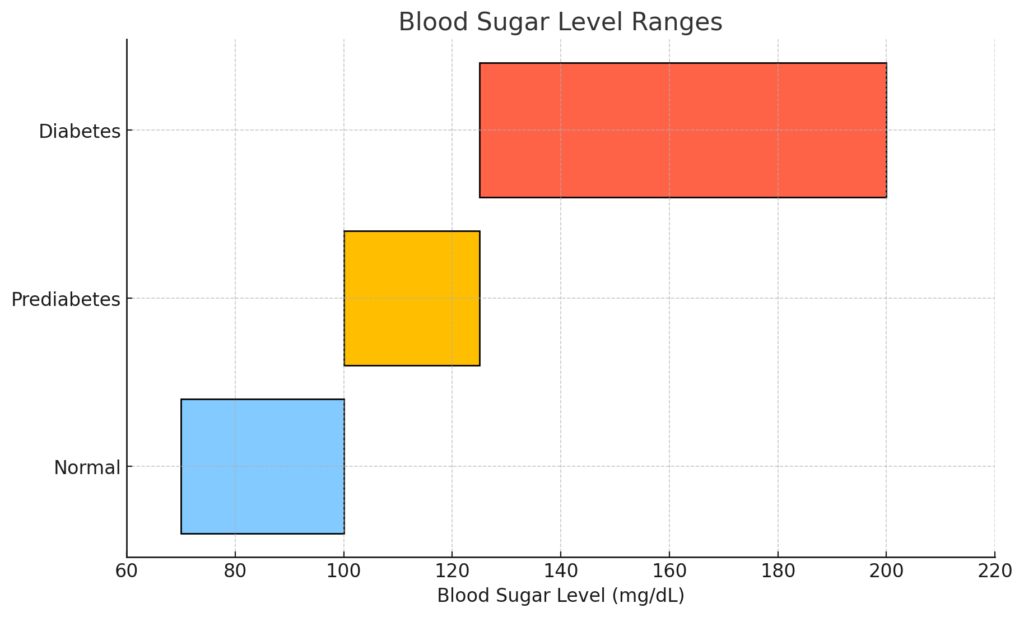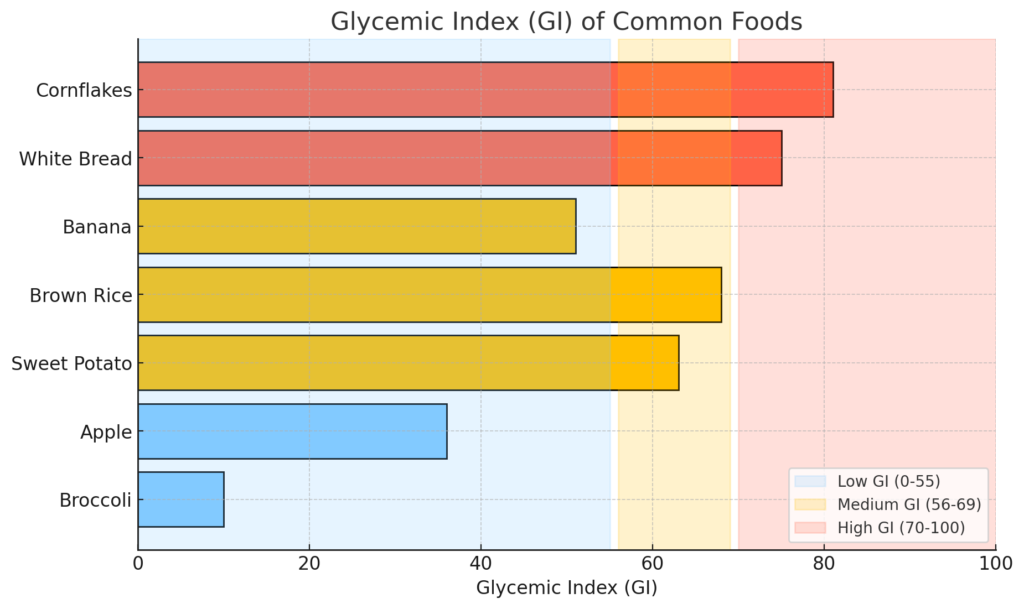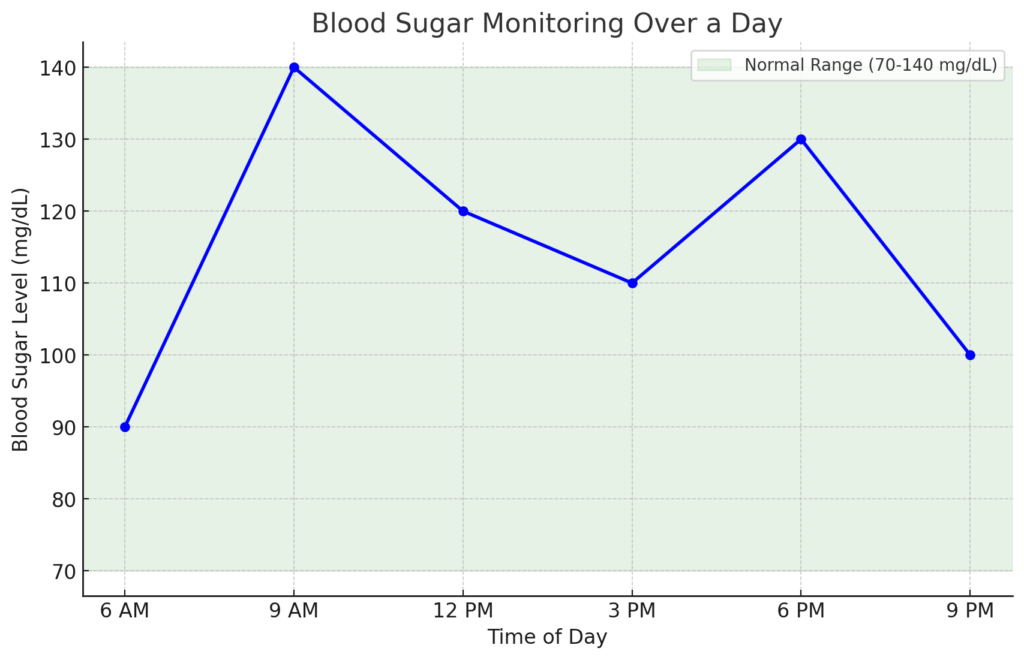Blood Sugar Information
Written By: Glucose Guild Staff

Reviewed by Paul Fuller, NP
✅ Medically Cited | ✅ Fact Checked

Blood sugar, or glucose, is the fuel our bodies run on. It keeps our brains sharp, our muscles working, and our energy up. But, just like with anything else, balance is key. If blood sugar is too high or too low, it can cause problems. That’s why it’s important to keep it in check.
Nowadays, with sugary snacks all around us and more time spent sitting than moving, keeping blood sugar stable has become tougher. This has led to more people dealing with issues like diabetes or low blood sugar. That’s why it’s important for everyone, not just those with a diagnosis, to keep an eye on their blood sugar.
Knowing how blood sugar works, what impacts it, and how to manage it can help you stay healthy. Whether you’re aiming to avoid future problems or handle an existing condition, understanding blood sugar is a big step towards better health.
Understanding Blood Sugar Levels
Blood sugar levels reflect the amount of glucose circulating in your bloodstream at any given moment. Keeping these levels within a healthy range is essential for your body to function smoothly.
What Are Normal Blood Sugar Levels?

For most people, normal blood sugar levels range between 70 and 100 milligrams per deciliter (mg/dL) when fasting, which means before your first meal of the day. After eating, your blood sugar naturally rises, but it should typically stay below 140 mg/dL. These numbers can vary based on factors like age, overall health, and how your body processes sugar.
How to Test Your Blood Sugar
To find out your blood sugar levels, you can perform a blood sugar test. Here are some common types:
- Fasting Blood Sugar Test: Taken after at least 8 hours without food, this test shows how well your body manages blood sugar in a fasting state.
- A1C Test: This test provides an average of your blood sugar levels over the past 2-3 months, giving you a broader view of how effectively you’re managing your blood sugar over time.
- Postprandial Test: Conducted after a meal, this test reveals how your body handles the sugar from food.
Regular blood sugar testing is crucial, especially if you’re at risk of high or low blood sugar. It helps you stay informed about your body’s needs and guides any necessary adjustments to your diet, exercise routine, or medications.
Understanding and monitoring your blood sugar levels is a vital step in maintaining good health and preventing serious complications.
Factors Influencing Blood Sugar
Several elements can impact your blood sugar levels. Understanding these factors is key to managing your blood sugar effectively.
Diet

What you eat significantly affects your blood sugar. Foods rich in carbohydrates and sugars—like bread, pasta, sweets, and sugary drinks—can cause your blood sugar to spike quickly. Conversely, foods high in fiber, such as vegetables, whole grains, and legumes, help maintain steady blood sugar levels. Eating balanced meals that include protein, healthy fats, and fiber can help you avoid sharp rises and drops in blood sugar.
Physical Activity

Exercise is crucial in managing blood sugar. During physical activity, your muscles use glucose for energy, which can help lower blood sugar levels. Regular exercise, whether it’s walking, swimming, or cycling, enhances your body’s ability to use insulin, the hormone that regulates blood sugar. Even small amounts of daily exercise can make a significant difference in blood sugar control.
Stress and Hormones

Stress can impact your blood sugar by triggering the release of hormones like cortisol and adrenaline, which can raise blood sugar levels, especially during prolonged stress. Managing stress through relaxation techniques such as deep breathing, meditation, or yoga can help stabilize blood sugar.
Medications and Supplements
Certain medications, particularly those for diabetes, are designed to help regulate blood sugar. Insulin and other diabetes medications assist your body in processing glucose more efficiently. Additionally, some supplements, like berberine, chromium, and alpha-lipoic acid, have been found to support healthy blood sugar levels. However, it’s essential to consult with a healthcare provider before starting any new medication or supplement.
By focusing on these factors—your diet, physical activity, stress management, and any medications or supplements—you can gain better control over your blood sugar levels and enhance your overall health.
Managing Blood Sugar Levels
Managing your blood sugar levels is crucial for maintaining good health and preventing complications. Here are some key strategies to help keep your blood sugar in a healthy range.
Dietary Tips
One of the most effective ways to manage blood sugar is through your diet. Focus on eating balanced meals that include a mix of protein, healthy fats, and fiber-rich carbohydrates. Here are some tips:
- Choose Whole Foods: Opt for whole grains, vegetables, fruits, and lean proteins. These foods have a lower glycemic index, meaning they raise blood sugar more slowly.
- Portion Control: Be mindful of portion sizes, especially when eating high-carb foods. Smaller portions help prevent large spikes in blood sugar.
- Avoid Sugary Drinks and Snacks: Sugary foods and beverages can cause quick spikes in blood sugar. Try to limit these and choose healthier alternatives like water, unsweetened tea, or fruit instead.
Lifestyle Changes
In addition to a healthy diet, certain lifestyle changes can make a big difference in managing blood sugar:
- Regular Exercise: Aim for at least 30 minutes of physical activity most days of the week. Exercise helps your body use insulin more effectively, lowering blood sugar levels.
- Stay Hydrated: Drinking plenty of water helps your kidneys flush out excess sugar through urine, which can help lower blood sugar levels.
- Get Enough Sleep: Poor sleep can affect your hormones and increase your blood sugar levels. Aim for 7-9 hours of quality sleep each night.
Monitoring and Medication

Regular monitoring of your blood sugar levels can help you understand how well your management strategies are working. Depending on your situation, your healthcare provider may recommend testing your blood sugar at home. If you have diabetes or another condition that affects your blood sugar, you might also need medication:
- Insulin: If your body doesn’t produce enough insulin or if it doesn’t use insulin effectively, your doctor may prescribe insulin injections.
- Other Medications: There are various oral medications that help manage blood sugar by increasing insulin production, improving insulin sensitivity, or decreasing sugar production in the liver.
Supplements
Some people find that supplements can help manage their blood sugar levels. Ingredients like Berberine, Alpha-Lipoic Acid, and Chromium have been shown to support healthy blood sugar. However, it’s important to talk to your healthcare provider before starting any supplements, especially if you’re already on medication.
By focusing on a balanced diet, staying active, monitoring your blood sugar, and following your healthcare provider’s advice on medications and supplements, you can effectively manage your blood sugar levels and support your overall health.
Common Conditions Related to Blood Sugar
Blood sugar levels play a crucial role in your overall health. Here are some common conditions linked to blood sugar:
Diabetes
Diabetes is a chronic condition that affects how your body handles blood sugar. There are three main types:
- Type 1 Diabetes: An autoimmune disorder where the body attacks insulin-producing cells in the pancreas. People with Type 1 diabetes must take insulin daily to manage their blood sugar levels.
- Type 2 Diabetes: The most prevalent form, Type 2 diabetes occurs when the body becomes resistant to insulin or doesn’t produce enough of it. This results in high blood sugar levels, which can be managed through diet, exercise, medication, and sometimes insulin.
- Gestational Diabetes: This type develops during pregnancy and increases the risk of the mother and child developing Type 2 diabetes later in life.
Hypoglycemia
Hypoglycemia, or low blood sugar, happens when blood sugar levels drop below 70 mg/dL. Symptoms can include shakiness, sweating, dizziness, confusion, and even fainting. Hypoglycemia is common in people with diabetes, especially if they take too much insulin, skip meals, or exercise more than usual. It’s vital to treat low blood sugar promptly by consuming fast-acting carbohydrates, like fruit juice or glucose tablets.
Prediabetes
Prediabetes is a condition where blood sugar levels are higher than normal but not yet high enough to be classified as diabetes. People with prediabetes are at a higher risk of developing Type 2 diabetes, heart disease, and stroke. The good news is that lifestyle changes, such as adopting a healthy diet, regular exercise, and weight loss, can help reverse prediabetes and prevent or delay the onset of Type 2 diabetes.
Metabolic Syndrome
Metabolic syndrome is a cluster of conditions that occur together, heightening the risk of heart disease, stroke, and Type 2 diabetes. These conditions include high blood sugar, high blood pressure, excess fat around the waist, and abnormal cholesterol levels. Managing blood sugar is a crucial aspect of preventing and treating metabolic syndrome.
Understanding these conditions and their connection to blood sugar is essential for managing your health and preventing complications. By staying informed and taking proactive measures, you can maintain healthy blood sugar levels and lower your risk of developing these conditions.
Supplements for Blood Sugar Management
In addition to making changes to your diet and lifestyle, certain supplements can significantly help in managing blood sugar levels. While they shouldn’t replace medical treatments, supplements can be a valuable addition to your overall blood sugar management plan. Here are some of the most effective ingredients known to support healthy blood sugar levels:
Berberine
Berberine is one of the most potent natural supplements for blood sugar control. It activates an enzyme called AMPK, which helps regulate metabolism and enhances insulin sensitivity. Research shows that berberine can lower blood sugar levels as effectively as some prescription medications.
Alpha-Lipoic Acid
Alpha-Lipoic Acid is a powerful antioxidant that improves insulin sensitivity and helps reduce blood sugar levels. It also protects against oxidative stress, which can damage cells and worsen diabetes-related complications.
Chromium
Chromium is an essential trace mineral crucial for carbohydrate and fat metabolism. It enhances insulin function, making it easier for your body to manage blood sugar levels. Chromium supplements are often recommended to support blood sugar control, especially for those with diabetes or insulin resistance.
Cinnamon Extract
Cinnamon is a well-known spice that has been studied for its blood sugar-lowering properties. It works by improving the body’s sensitivity to insulin and slowing down the breakdown of carbohydrates during digestion. Taking cinnamon extract as a supplement can help maintain stable blood sugar levels.
Gymnema Sylvestre
Gymnema Sylvestre is an herb traditionally used to lower blood sugar levels. It reduces sugar absorption in the intestines and enhances insulin function. Some studies suggest that Gymnema Sylvestre can also help curb sugar cravings and support healthy blood sugar levels.
Banaba Leaf Extract
Banaba Leaf contains corosolic acid, a compound recognized for its ability to lower blood sugar. It improves glucose uptake into cells, which can lead to reduced blood sugar levels. Banaba Leaf Extract is a common ingredient in supplements aimed at managing blood sugar.
Resveratrol
Resveratrol, an antioxidant found in grapes and red wine, is known for improving insulin sensitivity and lowering blood sugar levels. It may also provide additional health benefits, such as reducing inflammation and protecting against heart disease.
Choosing the Right Supplement
When selecting a supplement for blood sugar management, it’s important to consider your specific needs and health goals. Not all supplements work the same for everyone, so finding the right one may require some trial and error. Always consult with a healthcare provider before starting any new supplement, especially if you’re taking other medications or have an existing health condition.
Incorporating the right supplements into your routine can be a powerful tool in managing blood sugar levels, especially when combined with a balanced diet, regular exercise, and stress management. By choosing the right supplements, you can help keep your blood sugar in check and support your overall health.
